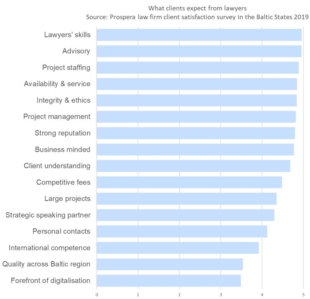Client satisfaction is the overarching aim for any business and law firms are no different. Sorainen’s core purpose is to help clients succeed in business, so it is essential to listen to our clients and hear what their needs and demands are. With that in mind, for five years we have been participating in the Prospera survey, which measures client satisfaction among law firms in the Baltic States and in this way helps participating firms to improve their client service. The survey looks at an array of qualities that make law firms appealing, and asks clients about the importance of each quality.
Increasing demand for lawyers to be more business-minded
According to Swedish researcher Martin Salomon of Kantar Sifo Prospera “Clients do not have legal issues, they have business issues (or opportunities). Consequently, one thing a business-minded lawyer should do is to invest significantly more time and effort into understanding the client’s business situation and what a successful business outcome for the client looks like. As opposed to diving straight down into the ‘legal issues’ involved and start producing lengthy memos and the like. Granted, getting a clear picture of a client’s business situation and the desired (as well as realistic) business outcome is not necessarily always straightforward, and clients can often have a somewhat vague idea themselves. But on the other hand, this is where a business-minded lawyer asks the right questions, has relevant experience from similar business situations and does not just cling to what they know best – the legal issues”.
Law firms need to embrace and invest in digitalisation
When asked about the background to adding to the survey a new question about digitalisation and effective use of IT tools, Martin explained: “The ‘legal tech hype’ we have witnessed during the past few years has perhaps been a little too focused on things like AI, ‘robot lawyers’, self-learning systems, and so on. It is quite interesting to get the client’s perspective on this. Clients do not put digitalisation very high up when ‘ranking’ the most important features of a law firm. However, when we ask clients to provide open feedback on what law firms can do to improve, we do see more and more feedback concerning the need for digitalisation. But the main theme is not so much regarding the actual ‘production’ of legal services, although a few clients may mention the efficiency gains of automated templates, document assembly systems or systems that speed up ‒ for example ‒ due diligence work. Instead, many comments are aimed at how law firms can communicate more efficiently and provide a better overview and transparency regarding client matters. I guess you could say that ‒ as of now at least ‒ clients are not so occupied with the idea that the actual legal advisory should be digitized. But when it comes to how digitalisation can improve cooperation and the client experience, there is much advantage to be gained. So one of the most obvious investments the research points to is to invest in a user-friendly ‘client portal’, and of course furnishing it with as much useful information as possible.”
TOP 3 improvement suggestions from clients to lawyers
Martin advises: “When we look at the most common ‘improvement comments’ from clients, the top 3 have to do with:
-
- working methods, project management, efficiency
- personal contacts, spending time with the client, proactivity
- pricing, cost-control, transparency
I would say that coming up with do-able ideas on how to improve on those three areas are powerful client satisfaction drivers, and for sure digitalisation can also play a role here.”
The Baltic market is uniform, but demands vary based on the client’s position
Martin Salomon further pointed out that “As to the markets surveyed, there were no specific differences between Estonian, Latvian and Lithuanian law firms or clients. I would rather point to the differences we believe exist between different buyers within the client organisation, where the C-suite and in-house lawyers can often have different ideas and expectations. To exemplify, C-suite would perhaps be even more concerned with the business-mindedness of the lawyers or team that they are working with. The in-house lawyer would, instead, often be more interested in efficiency issues, project management and transparency regarding fees, since the legal function is often under greater pressure to meet internal deadlines and keep to a set legal budget.”
What is the Prospera survey?
The Baltic law firm survey covers 300 Baltic-based organisations that spend at least EUR 15,000 on outside legal help annually (EUR 5,000 in Latvia). About half the respondents are top executives while a third are company lawyers. Read more about this year’s results here.



